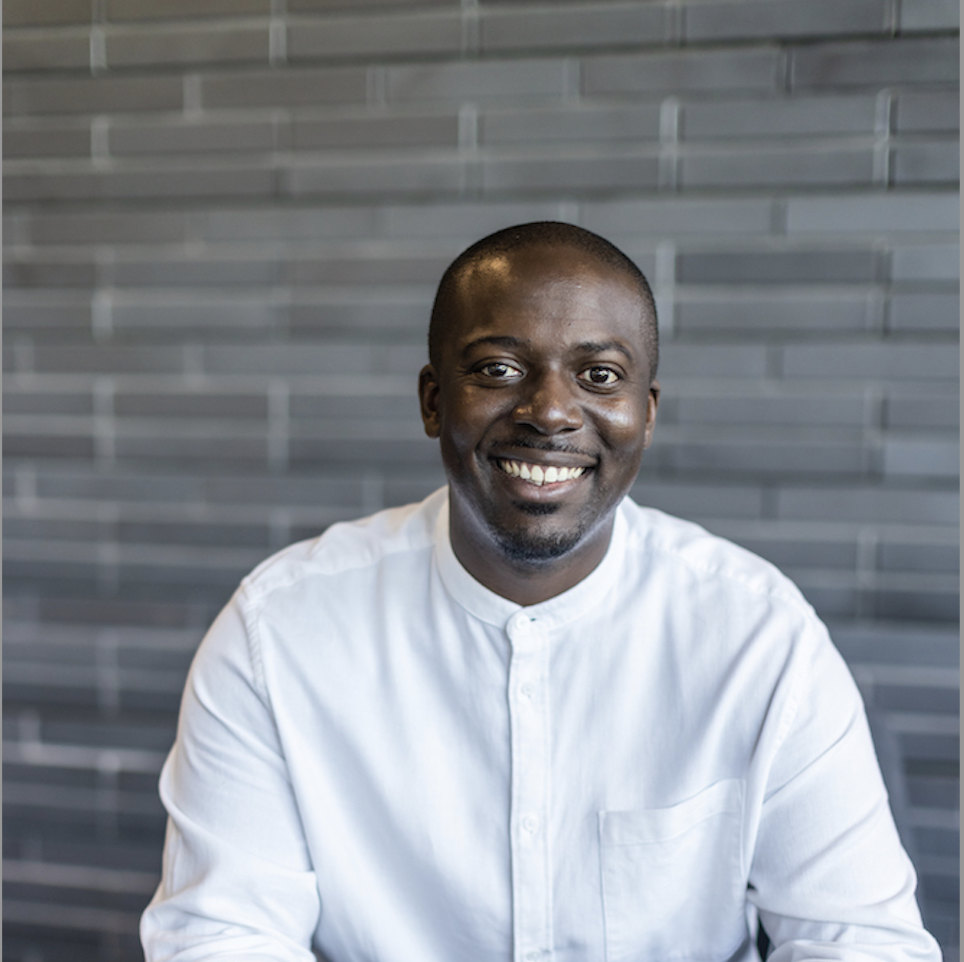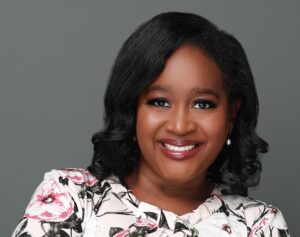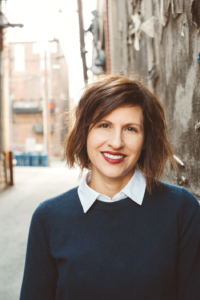Meet Keenan Jones
Keenan Jones, a Twin Cities (MN) based author originally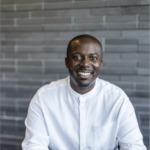 from northwest Indiana and south suburban Chicago, is a passionate educator and literacy advocate. He believes in the transformative power of literacy to inspire and empower young minds. Having always possessed a natural ability for writing, Keenan’s journey led him from the hardwood (basketball court), to the classroom as an elementary school teacher, and now back to his true passion of creating stories. Keenan is also a 2022 Mirrors and Windows fellow from The Loft Literary Center which is based in Minneapolis, MN and is one of the nation’s leading independent literary centers. His debut book, Saturday Morning at the ‘Shop, is scheduled for a January 2025 release by Beach Lane Books (Simon and Schuster) and illustrated by Ken Daley, beautifully captures the essence of the local barbershop and its significance in Black culture and community.
from northwest Indiana and south suburban Chicago, is a passionate educator and literacy advocate. He believes in the transformative power of literacy to inspire and empower young minds. Having always possessed a natural ability for writing, Keenan’s journey led him from the hardwood (basketball court), to the classroom as an elementary school teacher, and now back to his true passion of creating stories. Keenan is also a 2022 Mirrors and Windows fellow from The Loft Literary Center which is based in Minneapolis, MN and is one of the nation’s leading independent literary centers. His debut book, Saturday Morning at the ‘Shop, is scheduled for a January 2025 release by Beach Lane Books (Simon and Schuster) and illustrated by Ken Daley, beautifully captures the essence of the local barbershop and its significance in Black culture and community.
Keenan will be teaching “Bringing Picture Books to Life with Lyrical Language” and “From Indiana to the Big Five: My Journey to Publishing” and participating in the panel, “Diversity/Inclusivity in Literature and Publishing.”
Check out the Full Faculty and the Conference Schedule…
…then visit our Registration Page!
Q&A with Keenan
Keenan Jones is a whirlwind of energy and enthusiasm that permeates his writing and his teaching. His sessions will be filled with that same vim and vigor and authors of any genre and background will benefit from attending them.
MWW: You’ll be leading a workshop about lyrical language in picture books—but it sounds like it could benefit writers of any genre! Could you provide some examples of books (picture books or other) that use lyrical language?
 KJ: There is nothing better than popping open a book that just sings to you. When writing to incorporate lyrical language, there is rhythm, figurative language, cadence, length of sentence, repetition of sounds, and it has its own tempo. The musicality just spills out onto the page.
KJ: There is nothing better than popping open a book that just sings to you. When writing to incorporate lyrical language, there is rhythm, figurative language, cadence, length of sentence, repetition of sounds, and it has its own tempo. The musicality just spills out onto the page.
This session definitely isn’t just for picture book writers, I agree that it benefits all genres because it’s widely used, from nonfiction, to memoir, picture books, and novels. The list of books that use lyrical language is endless, but here are my thoughts of some of my favorites as of late: Crossover, Kwame Alexander (middle grade); Night Job, Karen Hesse (picture book); Last Stop on Market Street, Matt De La Pena (picture book); 1619 Project: Born on the Water, Nicole Hannah Jones and Renee Watson (picture book); and Brown Girl Dreaming, Jacqueline Woodson (Memoir).
MWW: I’m looking forward to learning about your journey to publication as a Black man. What were some hurdles you had to overcome, and where did you find support?
KJ: My unconventional path to being a published author was full of hills and mountains. I always knew that I could write; I dreamt about writing books, but I didn’t think it would happen. I stopped writing in high school because I was focused on playing basketball and thought it could provide me the opportunities to lead me down a positive path. Never did it cross my mind that I could write books. I went on to play college basketball but my career was cut short due to a career ending injury. From the encouragement of my college creative writing professor, I picked the pencil backup in the late 2000’s and wrote as I struggled with my mental health post-basketball. I struggled a lot, finding my identity, and the only thing that kept me afloat was writing.
My first middle grade novel was finished in 2013, and after some mild revisions, in my mind, I knew it would be a bestseller! Well, that was far from the truth and it was rejected by 50 agencies and although it was discouraging, I knew that I possessed stories that needed to be told. I also approached this process with zero knowledge of the publishing industry, nor did I know who to talk to. I had zero access to any programs, nor did I know of anybody who had ever written a book. Google helped and in my research I started to notice the issues of diversity in publishing, and it started to make sense why I, a Black male pursuing writing, struggled to get the support that I needed early on. Seeing the lack of representation and the tough road ahead actually lit a fire in me to keep going, despite the rejections and access to programming. One thing that I didn’t stop doing was writing. From 2010-2020, I continue to write and begin to send my manuscripts blindly to agents, editing my own work, getting rejected, still not having any access to programs, writing groups, any of that. I still knew that despite all of this, I had talent.
In the spring of 2020, during the pandemic and after George Floyd, I got really activated and motivated by the events. Not only did more people start to report on the issues of diversity and lack of representation in books, I was stuck in my house with nothing but time. For me, it was heaven sent because the school year was over and I had a bunch of manuscripts that I needed to tighten up. I was invited to join the Minnesota Writing Project, an organization affiliated with the National Writing Project and participated in a diversity leadership summer program for teachers writers, focused on equality. This was an opportunity for a month in the summer to lock in on writing, and was just what I needed. It’s challenging to find that writing groove when trying to balance between teaching, your manuscripts, and lovely but energetic kids (all girls, too!). Two of the professors, Lee Fisher and Jazmine, quickly noticed that I was a talented writer and encouraged me to apply for the Loft Mirrors and Windows Fellowship for BIPOC authors. It was exactly the type of opportunity that I needed, so I applied and was named a Fellow in 2021. I already had some manuscripts ready to go, so it was an opportunity to get some critiques from some awesome author mentors. Towards the completion of the fellowship in 2022, I secured my first deal with Beach Lane of S and S for Saturday Morning at the ‘Shop and the rest is history. Although I’m still navigating the industry in sort of this solo place, I’m fortunate that there are now Black authors, specifically Black male authors that I can connect with to give me some jewels on being successful in the world of publishing. Most importantly, little Black boys across the country can now see a mirror that will hopefully propel them to pick up a pencil and a notebook and tell their story.
MWW: What changes need to take place in order for the world of publishing and literature to become more inclusive?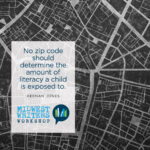
KJ: The only Black male authors that I knew as a kid were Langston Hughes, WD Meyers, and a ton of rappers. I had African American teachers in elementary school, but I still only remember those two. In hindsight, that was all that I needed. The impact of a teacher providing a mirror is very much the reason I’m writing today. I think educators can really play a significant role in having influence on the next generation of writers, not only by giving them mirrors in the classroom, but allowing them the opportunity to be creative and write freely.
In terms of publishing, not only do we need more cultural representation in books, but we need more Black editors, Black agencies, and just good people who are empathetic and understand the need for diversity in publishing. Having those folks at the table can be the difference of a book deal landing and one being passed on.
We should start cultivating writers in the early ages, exposing young people to books, getting books in the homes, no zip code should determine the amount of literacy a child is exposed to. A dream of mine would be to have writing centers in cities across America, rural, urban, and suburban that focus on literacy and writing. The more exposure these young people have, the more confident they will be, the more likely they are to write, and hopefully we will see their book on the shelves some day.
MWW: Who are some authors who have influenced and/or inspired you?
KJ: Honestly, my influences expand beyond authors, so I’m including rappers in this answer. Much of my style of writing, lyrical and musical, comes from my roots in Hip Hop. I also have a diverse range of influences, both men and women, and of all cultures. These artists and authors are not only great writers, but also have made major influences in communities across the country and have helped shape the industries that they are in. Innovative, inspiring, and experts in storytelling, their stories and songs have allowed me to dream and see myself as a reader/writer. Most importantly, these authors gave me hope in times of struggle: James Baldwin, Common, Walter Dean Myers, Kwame Alexander, Nikki Grimes, A Tribe Called Quest, Jay-Z, Nas, W.E.B DuBois, Jeff Kinney, Gary Paulsen, and Beverly Cleary.
Join us for #MWW24!
We’ve put together a broad range of workshops led by top-notch faculty so that you can reach new heights with your writing alongside brilliant writers from the Midwest and beyond!
*Attend online or in-person*
MWW is dedicated to building a community where writers can network with others and grow.
Click here for In-Person Registration
Click here for Virtual Registration
|
|

